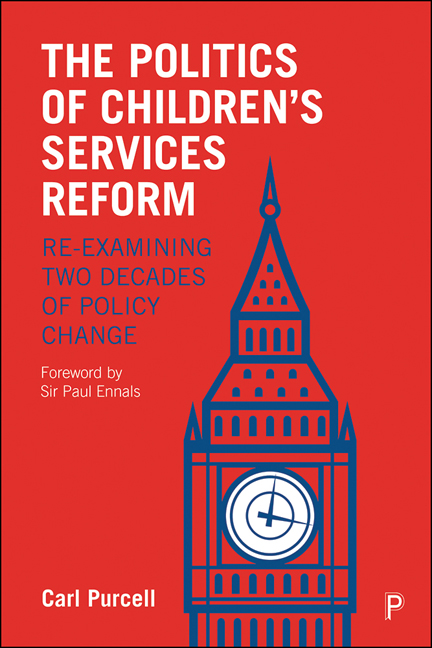Book contents
- Frontmatter
- Dedication
- Contents
- List of Abbreviations
- Acknowledgements
- Foreword
- Introduction
- 1 What Drives Children’s Services Reform?
- Part I Children’s Services Reform Under the Labour Government (1997– 2010)
- Part II Children’s Services Reform Under the Coalition and Conservative Governments (2010– 19)
- Conclusion: the Politics of Children’s Services Reform
- Appendix: Chronology of key Reports
- References
- Index
1 - What Drives Children’s Services Reform?
Published online by Cambridge University Press: 03 March 2021
- Frontmatter
- Dedication
- Contents
- List of Abbreviations
- Acknowledgements
- Foreword
- Introduction
- 1 What Drives Children’s Services Reform?
- Part I Children’s Services Reform Under the Labour Government (1997– 2010)
- Part II Children’s Services Reform Under the Coalition and Conservative Governments (2010– 19)
- Conclusion: the Politics of Children’s Services Reform
- Appendix: Chronology of key Reports
- References
- Index
Summary
Introduction
This chapter reflects on the existing literature on children's services reform and makes the case for further research following a different approach. Two overarching narratives on children's services reform can be identified in the existing literature. Both of these narratives emphasise the importance of contextual factors: the first highlights the role of the media and the significance of child abuse inquiries and scandals; and the second points towards the importance of the broader socio-economic context of the English welfare system. It is argued that neither of these perspectives takes full account of tensions and contradictions in children's policy or the range of interests involved in policymaking. The chapter also draws on competing theoretical perspectives on contemporary British policymaking to provide a guide for this research. An overview of the research design and process is provided in the final section.
Child abuse inquiries and scandals
Inquiries into the apparent failings of local welfare agencies are now commonplace (Stanley and Manthorpe, 2004). In recent decades, welfare reform has often followed scandals generated by media coverage of inquiry findings and the ensuing public outrage generated. Butler and Drakeford (2005: 5) comment that ‘Scandals are the policy equivalent of the earthquake; they are a powerful signal that change is occurring, or that the pressure for change has reached unsustainable levels.’ Children's services reform in England has been closely associated with scandals that have followed the publication of inquiries into serious cases of child abuse. Thus, Stafford et al (2012: 31) argue that ‘the media has been and remains one of the main drivers of system change’. In Warner's (2015: 2, emphasis in original) view, ‘emotions can be seen as the driving force behind policy and practice’. From this perspective, policymakers and professionals working in children's services are compelled to respond to the public anger and grief generated by media coverage of inquiries.
The Maria Colwell inquiry in 1974 (Secretary of State for Social Services, 1974) has been consistently identified as having marked a turning point for social services and the social work profession (Parton, 1985; Butler and Drakeford, 2012). Maria was murdered in 1973 after having suffered an extended period of abuse at the hands of her mother's partner, William Kepple.
- Type
- Chapter
- Information
- The Politics of Children's Services ReformRe-examining Two Decades of Policy Change, pp. 5 - 20Publisher: Bristol University PressPrint publication year: 2020



